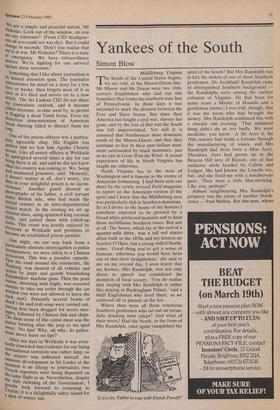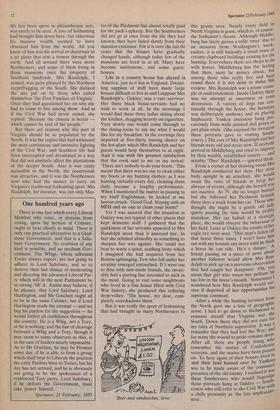Yankees of the South
Simon Blow
Middleburg, Virginia The South of the United States begins, we are told, at the Mason-Dixon line. Mr Mason and Mr Dixon were two 18th- century Englishmen who laid out this boundary'that forms the southern state line of Pennsylvania. In those days it was intended to mark the division between the Free and Slave States. But since then America has fought a civil war, slavery has gone, and by the loss of that war the South was left impoverished. Yet still it is assumed that Southerners must dominate south of the Mason-Dixon; and that they continue to live in their ante-bellum man- sions surrounded by black mammies, just as we saw in Gone With the Wind. A recent experience of life in North Virginia has taught me otherwise.
North Virginia lies to the west of Washington and is famous as the centre of American foxhunting. I had been sent out there by the newly revived Field magazine to report on the American version of the sport and I knew that the Middleburg area was particularly rich in Southern mansions. So as I drove to the house of my hostess I somehow expected to be greeted by a broad white porticoed mansion and to hear those mellifluous Southern tones. But not at all. The house, which lay at the end of a quarter-mile drive, was a tall red stucco affair built in the 1850s and my hostess no Scarlett O'Hara, but a strong-willed North- erner. 'Good thing you've got a sense of humour, otherwise you would have been out of that .door straightaway,' she said to me on my second day. I soon learnt that my hostess, Mrs Randolph, was not only direct in speech but considered the monarch of local society. 'You do realise that staying with Mrs Randolph is rather like staying at Buckingham Palace,' said a bluff Englishman who lived there, as we cantered off in pursuit of the fox.
Where then were all those courteous Southern gentlemen who sat out on veran- dahs drinking mint juleps? And what of their wives? Had the North, in the form of Mrs Randolph, once again vanquished the
Is it a sin, Father to vote with Enoch Powell?'
spirit of the South? But Mrs Randolph was in fact the widow of one of those Southern gentlemen. Dr Archibald Randolph came of distinguished Southern background the Randolphs were among the earliest colonists of Virginia. He had been for many years a Master of Hounds and a gentleman farmer; I was told, though, that it was his wives who had brought the money. Mrs Randolph confirmed this with a chuckle one evening: 'That industrial thing didn't do us too badly. We were medicine, you know.' A Dr Ayer in the 19th century had made a fortune through the manufacturing of tonics, and Mrs Randolph had been born a Miss Ayer. Theodora Ayer had grown up in the Beacon Hill area of Boston, one of that exclusive circle headed by Cabots and Lodges. She had known the Lowells too, but, and she fixed• me with a mischievous gaze: 'They were a little blue-stocking. Like you, perhaps!'
Almost neighbouring Mrs Randolph's property was the estate of another North- erner — Paul Mellon. But this man, whose
life has been spent in philanthropic acts, was rarely to be seen. A love of foxhunting had brought him down here, but otherwise his massive wealth seemed to have obscured him from the world. All you knew of him was his arrival or departure in a jet plane that sent a tremor through the earth. And all around there were more Northerners, and some of them living in those mansions once the property of Southern landlords. Mrs Randolph, I sensed, was quite pleased by this Northern carpetbagging of the South. She disliked the airs put on by those who called themselves 'the First Families of Virginia'. Once they had questioned her on why she had to come to live among them. And as if the Civil War had never ended, she replied: 'Because the climate is better which cannot be said of the people.'
But there are reasons why this part of Virginia should be so populated by the North. It was the region that had witnessed the most continuous and intensive fighting of the Civil War, and Southern life had been interrupted and devastated in a way that did not similarly affect the plantations of the deeper South. Also it was easily accessible to the North, the countryside was attractive, and it was the Northerners now who had the money to carry on Virginia's traditional foxhunting sport. Mrs Randolph, for instance, was not only Mas- ter of the Piedmont but almost totally paid for the pack's upkeep. But the Southerners did not go at once from the life they had known; they have faded slowly from their mansion existence. For it is over the last 60 years that the houses have gradually changed hands, although today few of the mansions are lived in at all. Many have become institutions, and some guest- houses.
Life in a country house has altered in America, just as it has in England. Dwind- ling supplies of staff have made large houses difficult to live in and I suppose Mrs Randolph's, Oakley, was a rare survivor. Her three black house-servants had no wish to work at all. In the mornings I would find these three ladies sitting about the kitchen, dragging heavily on cigarettes. Very slowly one would come through to the dining-room to ask me what I would like for my breakfast. In the evenings they departed at five-thirty leaving dinner on the hot-plate which Mrs Randolph and her guests would help themselves to at eight. And it was with the greatest satisfaction that the cook said to me on my arrival: 'There ain't nobody to do your boots.' This meant that there was no one to clean either my boots or my hunting clothes; as I was hunting virtually every day, cleaning them daily became a lengthy performance. When I mentioned the matter in passing to my bluff Englishman, he looked at me horror-struck: 'Good God. Staying with an MFH and no one to clean your boots!'
Yet I was assured that the situation at Oakley was not typical of other places that kept domestic staff. I gathered that the quirkiness of her servants appealed to Mrs Randolph more than it annoyed her. In fact she relished absurdity as something to sharpen her wits against. She could not bear to waste a quiet, scathing irony which I imagined she had acquired from her Boston upbringing. Few who fell under her scrutiny emerged untouched. If I went out to dine with new-made friends, she invari- ably had a parting line intended to stick in the mind. Going to visit some neighbours who lived in a fine house filled with Civil War history, she produced this reducing drop-volley: 'The house, my dear, com- pletely overshadows them.'
But it was really the sport of foxhunting that had brought so many Northerners to 'Beer and sandwiches, love.' this grassy area. Nearly every field in North Virginia is grass, which is, of course, the foxhunter's dream. Although Middle- burg has lately grown a trifle 'twee' due to an invasion from Washington's week- enders, it is still basically a small town of creamy clapboard buildings existing for the hunting. Everywhere there are shops to do with horses. Middleburg has the feeling that there must be money about, but among those who really live and hunt round there it is not done to make this evident. Mrs Randolph was a prime exam- ple of understatement. Inside Oakley there was no attempt at smartness or even decoration. A variety of dogs ran con- tinually through the house, the furniture was deliberately unshowy and its placing haphazard. Yankee ancestors hung pre- cariously from walls painted dull green or just plain white. (She enjoyed the irritation these portraits gave to visiting South- erners.) The cars of Mrs Randolph and her friends were old and never new. If anybody arrived in Middleburg and tried to impress by their wealth, established society — and notably 'Theo' Randolph — ignored them- From a corner of her drawing-room Mrs Randolph conducted her days. Her stout body upright in an armchair, she would await the visits of friends to keep her abreast of events, although she herself was not inactive. At 79, she no longer hunted but she followed her Piedmont hounds three days a week from her car. Those who thought she might be a gentle old ladY quiety passing the time would be swiftly mistaken. Her car halted at a strategic place, she would observe the behaviour of her field. Later at Oakley the results of her eagle eye were seen. 'That man's fallen off that horse three times. I won't have him out with my hounds any more until he finds a horse he can ride. He's a danger.' A friend passing on a piece of news about another follower would allow Mrs Ran- dolph to pick up on a previous observation that had caught her sharpness: 'Oh, Ye!'ll mean that girl who wears her pelham hit too low in the horse's mouth.' Sometimes I wondered how Mrs Randolph would sur- vive if deprived of her opportunities for asperous comment. After a while the hunting invasion from the North gave me a loss of geographic sense. I had to go down to Richmond to reassure myself that Virginia was the South. Down there they did not care for my tales of Northern superiority. It was a reminder that they had lost the War; and for many the wound to pride remains deep. After all, there are people living who remember the stories of Confederate veterans, and the stories have been passed on. To hear again of their houses lived In and their land hunted over by Yankees was to be made aware of the continued presence of the old enemy. I realised it was these Southerners who would begrudge those portraits hung at Oakley — S°tIth- erners who still refer to the Civil War with aecshsi.11y proximity as 'the late unpleasant-
n











































 Previous page
Previous page